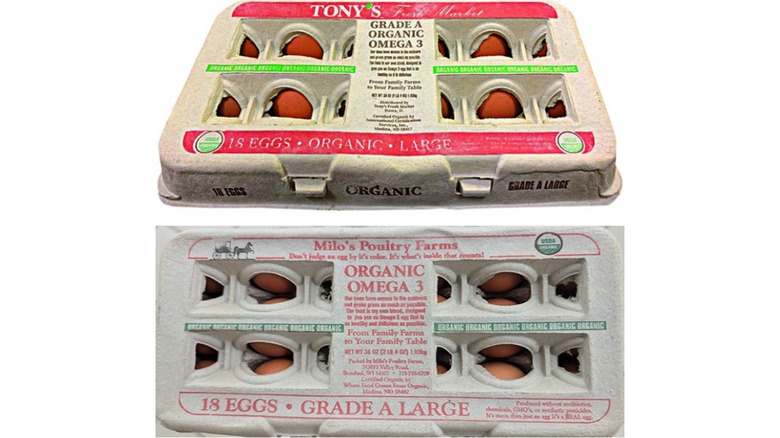The Egg Brands Affected By The New Recall For Salmonella
Bacteria-based illnesses such as Salmonellosis continue to crop up in the United States, with the U.S. Centers for Disease Control and Prevention (CDC) estimating that 1.35 million people every year contract gastrointestinal illness due to salmonella bacteria. The latest cases involve a poultry farm in Wisconsin, though the culprit is eggs rather than poultry itself. The salmonella contamination is traced to Milo's Poultry Farms in Bonduel, Wisconsin, which has issued a widespread recall of all egg products carrying labels of either Milo's Poultry Farms or Tony's Fresh Market.
All types of eggs, in all cartons, sizes, and expiration dates, are subject to the recall, including cage-free, organic, and any other designations. Eggs carrying the bacteria were sold to retailers and restaurants in Wisconsin, Michigan, and Illinois, subsequently infecting 65 known individuals across nine U.S. states, some as far away as California, Utah, and Colorado. At least 42 of the Salmonellosis illnesses have been reported in Wisconsin, with 24 known hospitalizations. No deaths have been tied to the infections as of this writing.
Salmonella bacteria can affect any age group. In the case of the Wisconsin outbreak, the ages fall between 2 and 88. Depending on symptom severity, many who fall ill may fail to report or seek medical assistance, meaning that cases are potentially much higher. Anyone currently in possession of eggs bearing labels of Milo's Poultry Farms or Tony's Fresh Market should immediately dispose of or return them to the store. It's also important to proactively disinfect all affected surfaces and items using hot soapy water.
Be aware of Salmonella symptoms
Even if you're not affected by the current Salmonella crisis springing from Milo's Poultry Farms in Wisconsin, it's still wise to be aware of the issue. After all, Salmonella bacteria and resulting foodborne illness can come from varying sources. In addition to poultry and eggs, the bacteria have the potential to live in pigs, reptiles, cows, and other livestock. They can even be contracted from other foods that have come in contact with animal feces. It's also possible to spread from live animals to humans through touch or indirect contact.
Known U.S. Salmonella-based foodborne illnesses in 2024 alone have thus far involved the currently affected eggs, but also cucumbers in 14 states, more than 830,000 cream cheese items, and charcuterie products sold at Costco, as well as cantaloupes, fresh basil, and dog food, per food safety alerts by the CDC. Though it's almost impossible to predict contamination, it helps to know the symptoms of salmonellosis and seek medical care if needed.
Symptoms to look out for include fever, stomach cramps, and diarrhea, and potentially headaches, nausea, and vomiting. They can start as early as six hours or up to six days after eating contaminated food, generally lasting four to seven days. Seek medical care for fevers above 102 degrees Fahrenheit, bloody stools, persistent unimproved diarrhea exceeding three days, and lengthy periods of vomiting. It's also crucial to note signs of dehydration, such as dizziness, limited urine output, and dryness in mouth or throat areas.

